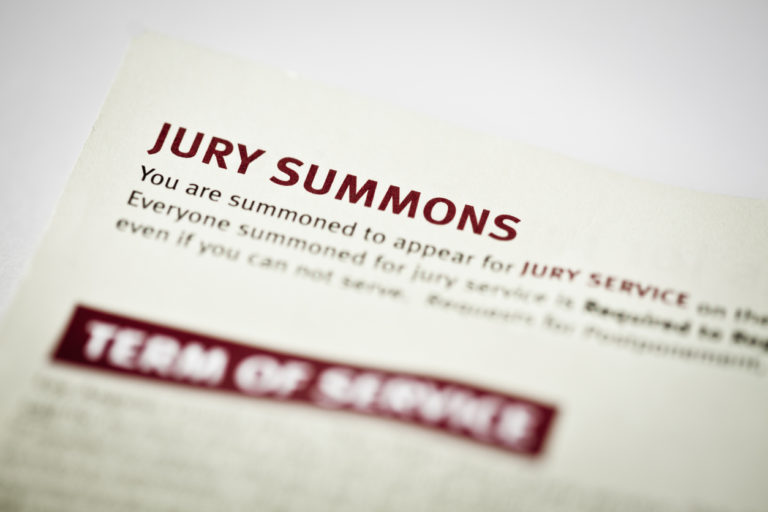Some citizens construct elaborate plans to dodge jury duty, avoiding the responsibility as if it were a plague – 100% unenthused to take time away from work, family, and regular life habits in exchange to serve as a juror. Other citizens view jury duty as an exciting civic duty – an opportunity to contribute to the justice system, help the community, and take an intimate peek at the inner-workings of a local courtroom.
One way or another, people have pretty strong views about jury duty! And, oftentimes, these views are formed without knowing what jury duty entails. This article aims to clear up some common misconceptions about jury duty and help clarify the process of being called to serve as a juror in Las Vegas.
As per NRS 6.0101, whether or not you are a registered citizen of Nevada, the State may call upon you to serve as a juror. As long as you have sufficient knowledge of the English language and have not been convicted of treason, a felony, another “infamous crime,” nor are incapable of serving physically or mentally, you can serve as a juror.

That’s it, in a nutshell. Exemptions will be discussed later on, but for now, let’s assume you are qualified to serve as a juror and have been called to jury duty. What does that entail?
As noted, jury duty is considered a civic duty, so don’t expect fancy compensation for the time you spend deliberating in court. However, as per NRS 6.1502, if you are summoned as a juror, you are entitled to a fee of $40 per day for each day you are in attendance in response to the summons after the second day of jury selection.
On top of that fee, a board of county commissioners may provide you with a per diem allowance and travel expenses for the time you are serving as a juror. The travel expenses come to 36.5 cents for each mile traveled if your residence is over 30 miles from the place of trial. If your home is over 65 miles away, and the trail lasts more than one day, you are entitled to receive an allowance for lodging (on top of the daily $40 fee and possible per diem) so that you can stay closer to the court, rather than at your home.
All fees are paid daily, in advance, to the clerk of the court or the justice of the peace. At the end of the trial, each juror will receive immediate payment in cash of the amount they are owed.
Under circumstances in which a juror wishes not to receive payment for his/her services, NRS 6.1553 discusses a program that allows a juror to donate his/her money to an agency that provides child welfare services.

What if I’m called to jury duty, and I don’t show up? Any individual summoned as a juror who fails to appear and serve will be found in contempt and fined up to $500, according to NRS 6.0404.
“Found in contempt” means that the court considers that you have broken the law by not showing up for jury duty. It means that you willfully disregarded a court order.
If you fall into the category of people who feel anxiety simply hearing the words “jury duty,” your number one concern may be how to avoid being summoned. Remember: the only way to get out of jury duty is to avoid it legally, so your legal options are explored below:
NRS 6.0205 states that you are legally exempt from jury duty service if you are a member of the Legislature or an employee of the Legislative Counsel Bureau, if you are a police officer, if you are over 70 years of age, or if you are over 65 years of age and live 65 miles or more from the court.
That’s it!
Those are the only legal exemptions from being called to serve. However, having said that, there is a myriad of other reasons that jurors may be excused after they are found eligible or even after they have already been chosen. Some of those reasons include:
Also, if the person who was called to jury duty is the primary caregiver of another person with a documented medical condition that requires the summoned juror to be present with them at all times, that potential juror may be excused.
Finally, the court has the right to excuse any potential juror from jury duty if they are deemed physically or mentally disabled.
Can my boss fire me if I’m serving on jury duty? As per NRS 6.1906, any person, employer, corporation, partnership, or association who “deprives the juror or person summoned of his or her employment as a consequence of the person’s service as a juror or prospective juror” will be found guilty of a gross misdemeanor by the court.
Roughly translated, that means it is a crime for your employer to terminate you due to missing work because you were a juror or prospective juror.

Assuming you meet the basic qualifications to be a juror, you still need to be officially selected from a vast pool of other qualified citizens. What determines who is chosen? That is a complex process, but the basics are explored here:
Typically, prospective jurors are found via their drivers’ licenses, voter registration lists, and other official offices in Nevada. Once you have been notified that you are a prospective juror, lawyers from both the defense and the prosecution may question you about your ability to serve as a juror.
Some of the questions they ask may have to do with your relationships with any of the attorneys, witnesses, defendants, plaintiffs, etc., if you already have information on the case, and if you have any religious, moral, philosophical, or other ideologies that might stop you from making a fair and impartial judgment of the case. You may also be asked to share information about your job, educational background, and previous involvements as a juror.
After this round of questioning, both the prosecution and defense have the right to excuse a certain number of potential jurors. Attorneys are not allowed to excuse jurors due to their race, gender, or sexual orientation.